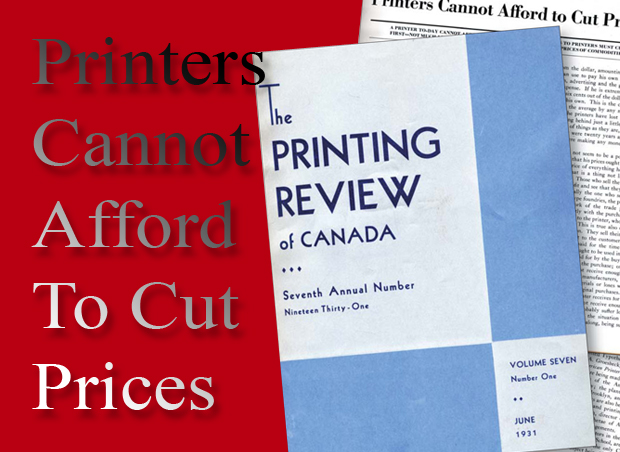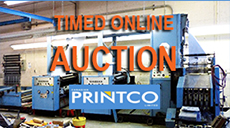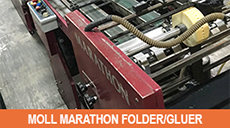
|
|
| Home › Articles › Here |
  |

|
||||||||||||||
| By: Nick Howard | Date: June 2010 | Contact the Author |
|||||||||||||||
Cont'd from Part 1 |
|||||||||||||||
| Perhaps going back further into history,
one would also read about challenges facing
the industry all the way to the Washington
Press. In 1931, there were plenty of
opportunities to be profitable. Most establishments
at that time would have been
running letterpresses, with nowhere near
the machine efficiency of modern-era
printing plants. We can learn that without keeping technological pace in better and more efficient equipment, many of us still battle the price versus profit issue. This is to say, all printers must battle this issue, but smart printers remove it from being their core challenge. Lithography in 1931 was in its infancy. Colour was very expensive. Labour, as a percentage of production costs, was way higher than today, as there were so many complicated production steps back then. In hindsight, it seems that, even though an economic depression was in full bore, there were printing companies that worked a little smarter, ran their businesses a little tighter and, most importantly, lowered the costs of print. The pricing pressures facing the printing industry are only going to become more intense as age-based demographics shift more attention toward on-screen communications. While the industry will continue to contract, printing companies will have no choice but to strategically leverage new technologies to drive production costs much lower in order to remain affordable. The pricing pressures facing the printing industry are only going to become more intense as age-based demographics shift more attention toward on-screen communications. While the industry will continue to contract, printing companies will have no choice but to strategically leverage new technologies to drive production costs much lower in order to remain affordable. Into the new Various Web-to-print strategies, for example, have resulted in much lower pricing on specific print markets – think Vistaprint and business cards. This concept turns a brick-and-mortar business into an almost self-serve arrangement. If your business still runs on a more traditional structure, then look to make changes in a hurry. Surprisingly, there are many offset presses running in Canada that are unable to offer almost instantaneous print directly from files. In most (but not all) cases, the company assumes that if cylinders are turning or the press is paid for, it automatically means margin. It does not. The machine-tool industry has some similarities to print. Machine shops, especially general jobbing outfits, have had to update in order to prevent work from heading to other cheaper countries and competitors. The CNC machine tool centre, for example, was at one time never seen as a traditional machine shop: Just manual lathes, and a couple vertical or horizontal mills. Tons of labour input. So when the larger faster turnaround work came in, it could not be produced cheap enough. As you consider what lies ahead and how you want to grow your business, think about technology. Think about what can be learned from 1931 and how the same problems existed then. Look to your pressroom and finishing equipment for clues on how they rate in terms of efficiency. Maybe, just maybe, the guys selling for less are all not selling under cost, but just selling under your cost. These same printers are probably also spending to expand the offerings that they can provide to a customer. This could include services you do not – will not – include. Even though we may face more pressures today than in 1931, the commentary taken from The Printing Review of Canada is not the message that our industry should be focused on, right now. Costs and productivity go hand in hand. Just as we would now laugh at anyone paying $400 for a colour separation, we must accept the fact that our customers share a similar view. For printing companies that want to be a part of the future of communications, the message is very simple: Lower costs with current advances in technology and processes. And to back that message up with another, one that is too often dismissed as commonplace, but one that really bears repeating: Do not dwell on the past, you might get run over by those people who only look ahead. |
|||||||||||||||
| Contact the Author | |||||||||||||||
|
|||||||||||||||





